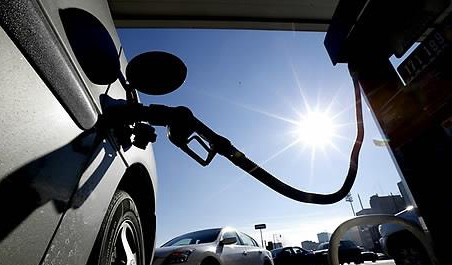Oil plunged to fresh 12-year lows under $27 on Wednesday, slammed by gloomy economic forecasts, China's slowdown and abundant crude supplies.
In late afternoon deals, US benchmark West Texas Intermediate for February delivery tanked to $26.30 per barrel, a level last seen in early May 2003.
The contract later stood at $26.50, down $1.96 from Tuesday's closing level.
The global oil market has collapsed further since the International Energy Agency warned Tuesday that the oil market could "drown in oversupply".
Prices have crashed about 75 percent since mid-2014, hit by a perfect storm of a stubborn supply glut, the slowing global economy and the rebounding US dollar.
"A stronger dollar continues to present significant headwinds and supply increases show little sign of letting up any time soon," Sucden analyst Kash Kamal told AFP.
 |
(AP-Yonhap) |
"This is very much a supply issue, as global demand has on the whole been quite healthy -- but it is likely we will see additional price declines and tighter margins before producers are prompted to cut output."
The strong dollar meanwhile makes dollar-priced crude more expensive for buyers using weaker currencies. In turn, that dents demand and prices.
In London meanwhile, Brent North Sea crude for delivery in March tumbled to $27.11, a low last witnessed in early November 2003.
Brent later stood at $27.34, down $1.42 from the close on Tuesday.
Crude futures are also in freefall with the supply glut set to worsen, as Iran pumps out extra barrels after the lifting of Western sanctions on Tehran.
The IEA predicted Tuesday that prices would fall further this year as supply vastly exceeds demand, with major oil exporter Iran's return to the market offsetting any production cuts from other countries.
Supply glut
The market has been awash with supplies owing to high production levels by the United States and the OPEC cartel, which last year refused to slash output as it looks to maintain market share.
Iran on Monday ordered a boost to crude production a day after the West lifted sanctions on the country in response to Tehran's compliance with a deal on curbing its nuclear programme.
Iran's National Iranian Oil Company said it had ordered an increase in output of 500,000 barrels per day (bpd). The country currently produces 2.8 million bpd and exports just over a million.
"The market is already awash with the stuff and now Iran is adding to the mix, so we may witness even lower oil prices and for longer," predicted analyst Fawad Razaqzada at traders Gain Capital.
Kamal added that the 12-nation OPEC cartel has continued to pump above its official output target, adding to the supply glut.
"Prices are forecast to remain under pressure and will likely fall further as crude output from OPEC remained well above its 30 million bpd production quota in December, estimated at 32.89 million bpd," he said.
"The cartel lacks production discipline and we expect this production glut to persist at the start of 2016.
"With Iranian crude set to hit the market imminently, to the tune of
500,000 bpd, we could see the (oil) price come under additional pressure in the short term."
WTI is currently down more than 20 percent from its value from the start of
2016 after dropping by 30 percent last year.
Brent is down about 22 percent from the start of the year, in addition to the almost 35-percent plunge it suffered in 2015. (AFP)




![[Herald Interview] 'Trump will use tariffs as first line of defense for American manufacturing'](http://res.heraldm.com/phpwas/restmb_idxmake.php?idx=644&simg=/content/image/2024/11/26/20241126050017_0.jpg)

![[Health and care] Getting cancer young: Why cancer isn’t just an older person’s battle](http://res.heraldm.com/phpwas/restmb_idxmake.php?idx=644&simg=/content/image/2024/11/26/20241126050043_0.jpg)

